General
Mak Gender Mainstreaming Directorate Holds Reflective Workshop on Promoting Women’s Participation in Leadership
Published
1 year agoon
By
Mak Editor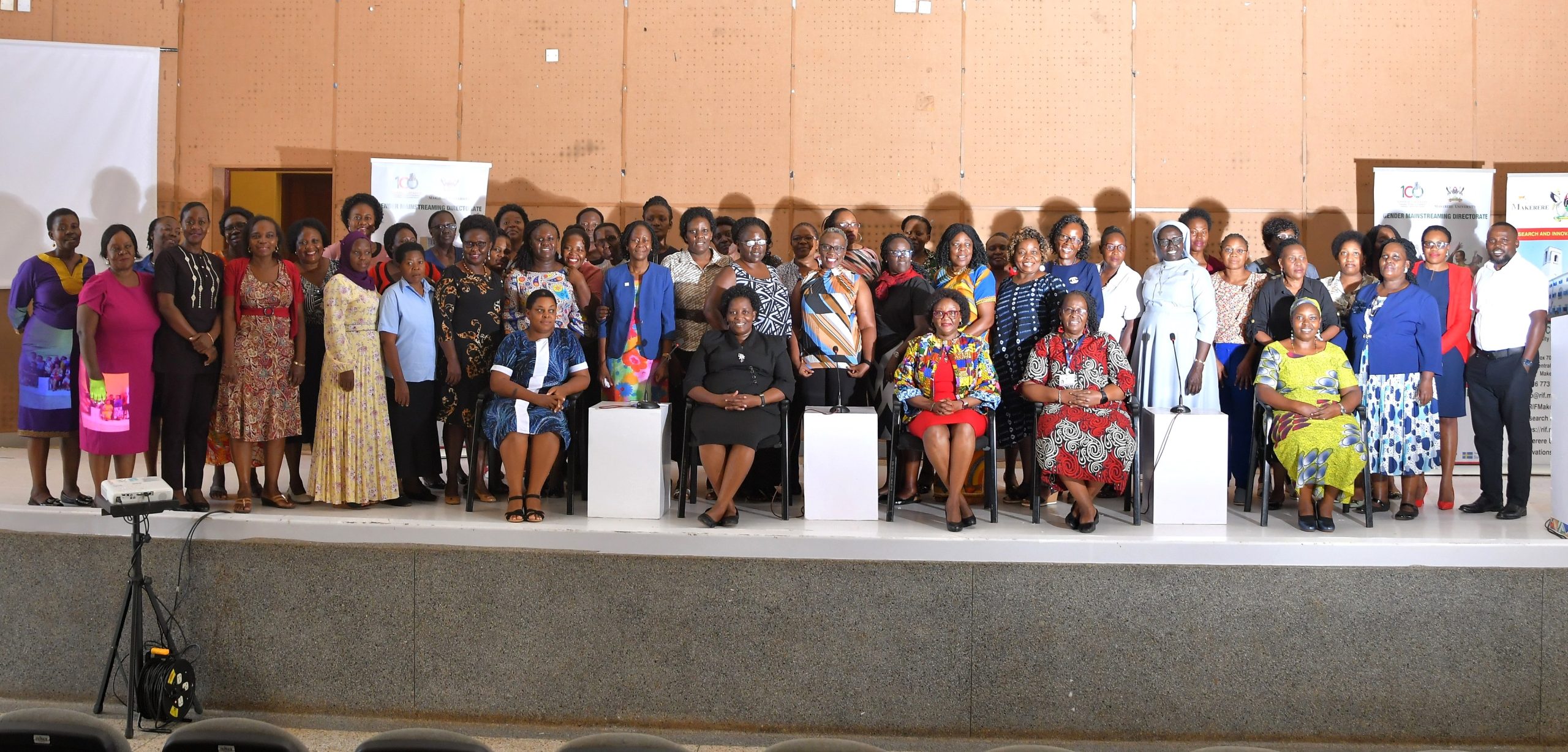
By Racheal Kanyi
“Position yourself and make yourself visible and known for something”, this was among the many takeaway points for participants at the reflective workshop for the women leaders at Makerere University. The workshop held on the 13th June 2024 in the Auditorium at the Yusuf Lule Central Teaching Facility (CTF 2) was convened by the Directorate of Gender Mainstreaming (GMD) at Makerere University. It was one of a series of activities that have been conducted by the Directorate under a project titled: Enhancing women’s participation and visibility in leadership and decisionmaking in Universities in Uganda through action and evaluation research, 2019-2024. This is one of the multi-year research projects funded under the Makerere Research and Innovations Fund (MakRIF) and is led by the Director GMD, Dr. Euzobia Mugisha Baine. Participating Universities are: Makerere, Gulu, Busitema, Mbarara University of Science and Technology, Kabale and Muni.
Purpose of the workshop
Held under the theme – Nurturing women in University leadership through mentorship and experience sharing, the purpose of the workshop was to provide a forum for experience sharing among female staff in middle and senior level leadership and management positions equivalent to M3-M5 salary scale.
Setting pace for experience sharing, the Director, Directorate of Gender Mainstreaming at Makerere University, Dr. Euzobia Mugisha Baine briefed participants on the mandate of GMD, outlining the policies and their role in promoting gender equality at the University. In her remarks, she noted that the mandate of GMD is derived from two main policies namely; i) the Makerere University Gender Equality Policy 2009, which envisions Makerere University to become a gender-responsive University in which substantive gender equality is reality, and ii) the Makerere University Policy & Regulations against Sexual Harassment of 2006, as amended in 2018 with a vision to coordinate, facilitate and monitor the integration of the gender dimension into the core functions of Makerere University including; Teaching and Learning, Research and Innovations, Knowledge Transfer Partnerships, and Support Services.
Dr. Baine noted that the purpose of conducting the workshop was;
- In response to two strategic areas of the GMD Gender Equality Policy namely;
- Gender-responsive staff recruitment, training, promotion and recognition (eg numbers of women and their progression),
- And promotion of women’s participation in leadership and decision-making organs (numbers and visibility).
Other objectives included; Providing an opportunity for participants to understand the gender and leadership landscape in Higher education, enable them appreciate the gender-based challenges along women’s career path and how to overcome them, and to generate strategies on how women senior staff can position themselves for future leadership.
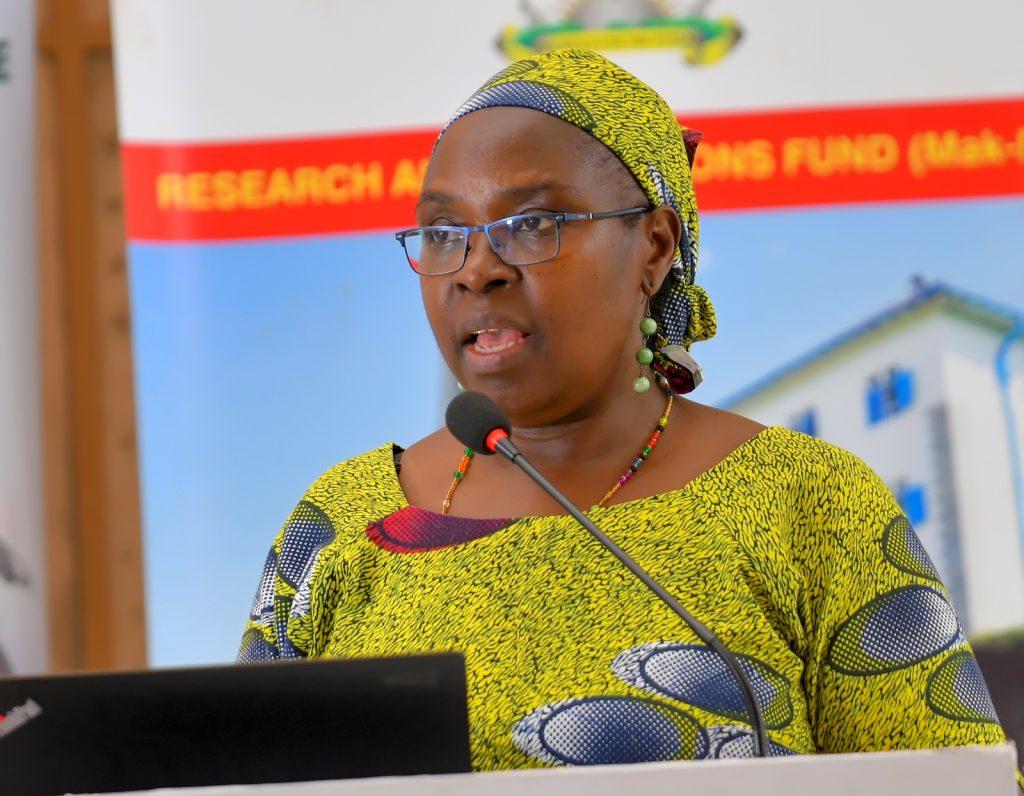
In her presentation, Dr. Baine who is also the project Principal Investigator, called upon women to gain confidence and stand out whenever leadership opportunities arise. “There is need for women to be on the discussion table, making decisions as opposed to keeping at the back. It is high time women gained confidence and took on these leadership opportunities. It all starts right from where you are,” she said.
Factors holding back women from taking up leadership roles
Presenting the research findings on behalf of the project team, Dr. Anna Ninsiima noted that despite all efforts at national and international levels, women were persistently fewer in leadership and decision-making organs in both public and private universities. The main objective of the study was to conduct a situational analysis of the gender terrain of the six public Universities to obtain baseline information encompassing: composition of governance and leadership organs by sex, composition of senior staff by sex, needs assessment and profiles of potential mentors and mentees, capacity to conduct gender-responsive research, exploration of men staff engagement in gender equality/equity interventions, and to establish a functional Uganda University Women Forum starting with the 6 universities.
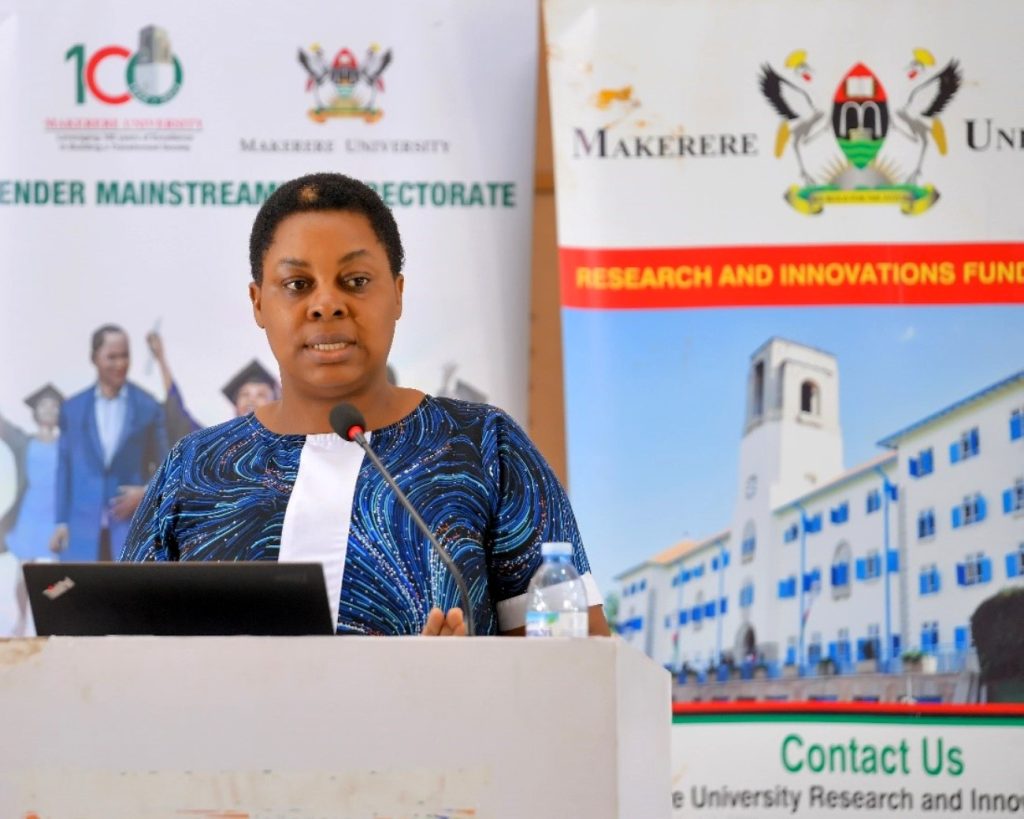
Dr. Ninsiima revealed that according to the feedback collected, the main causes of low numbers of women in leadership in universities were;
- A strong disconnection between the laws and policies at national level and the Universities,
- Patriarchal traditional norms and perceptions regarding female leadership, where there is unacknowledged institutional bias against women leaders,
- Top positions in the University are political and require women to do more background work, and to lobby their way into leadership positions,
- Institutional-toxic, militaristic environment. Unsaid resistance by institutions,
- Personal – poor self-image and esteem, want soft landing- some fear judgment,
- And social/family background.
Prof. Rhoda Wanyenze on promoting women’s participation in leadership
The Dean, School of Public Health, Prof. Rhoda Wanyenze urged women to dedicate time to understanding themselves better, capitalize their strengths, acquire soft skills and competencies, and to rebuke toxic talk if they are to effectively participate in leadership. “Leadership starts with understanding yourself. Speak to yourself, identify good things in you, know you capabilities and work on your weakness. There is need for women to mentor each other, its one way of uplifting ourselves. We also need to know that not everyone can make it into leadership – some of us have to open doors for others to get there. Let’s sponsor each other and avoid toxic talk that holds us back and encourage each other into these leadership spaces,” she noted.
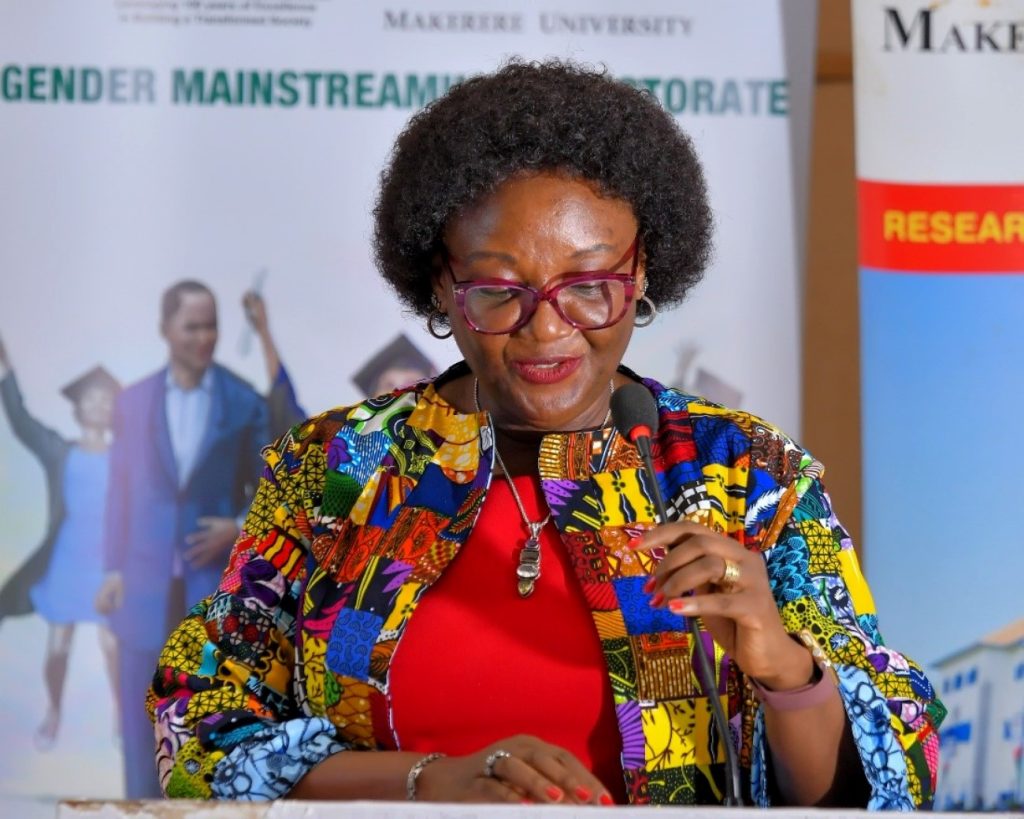
Strategizing for leadership
Sharing on her leadership experience, the Deputy Vice Chancellor Academic Affairs, Bunyoro University, Prof. Grace Bantebya Kyomuhendo advised women to strategize and use every opportunity available in leadership by showing up, even when they know they will not win the race. “Mere showing interest is a visibility gate for you to be known and adopt good networks in the world. If you intend to be a leader, study the big picture. You have to prepare, get the skills, get collaborations, know what you want, be available and willing to take on responsibilities. Study the environment and be careful how you share your intentions with people. If there is an opportunity and you have interest in it, apply for it, if you go through, that’s great, if you don’t, you won’t die, other doors will still open,” she advised.
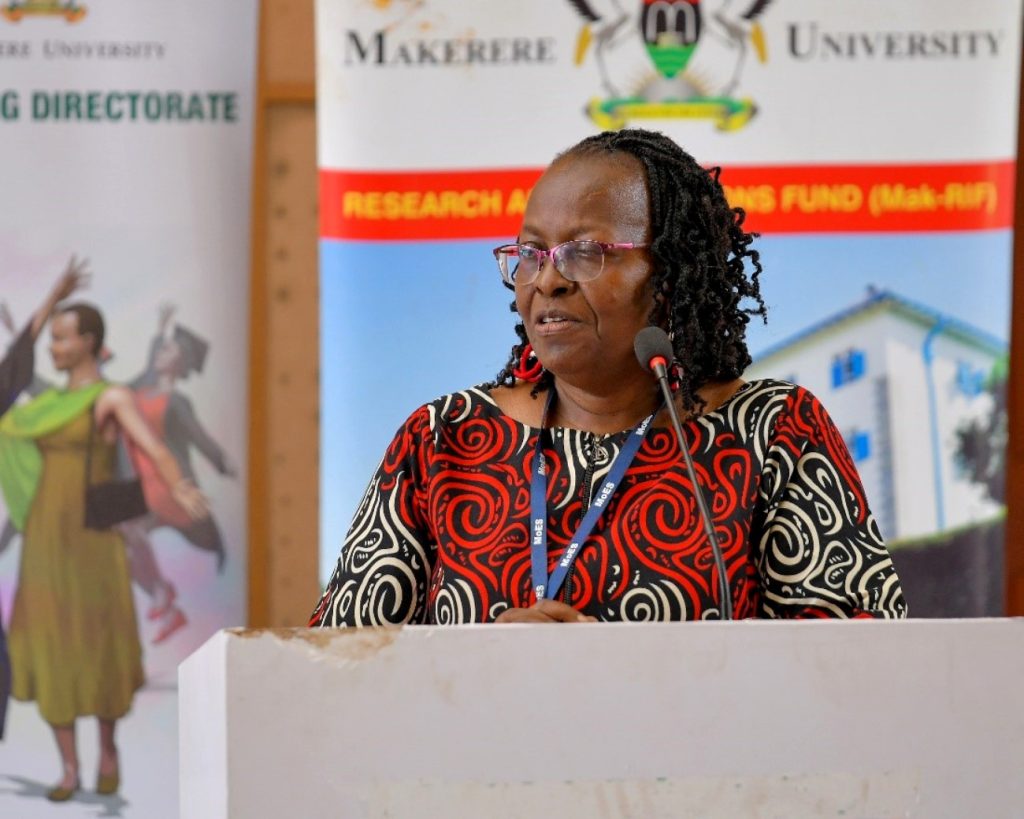
Genesis and mandate of GMD
The Chairperson Makerere Council Committee responsible for Gender Mainstreaming who also doubles as the Dean, School of Women and Gender Studies, Prof. Ssali Sarah revealed that the Gender Mainstreaming Directorate came to existence by visionary women who also contributed to the establishment of the School of Women and Gender Studies with mainly two objectives;
- To promote gender parity
- To monitor and hold people accountable
She reiterated the need to address the behavioral and structural barriers that limit women from rising and staying in leadership noting that this will help have more women occupy the leadership spaces in the universities.
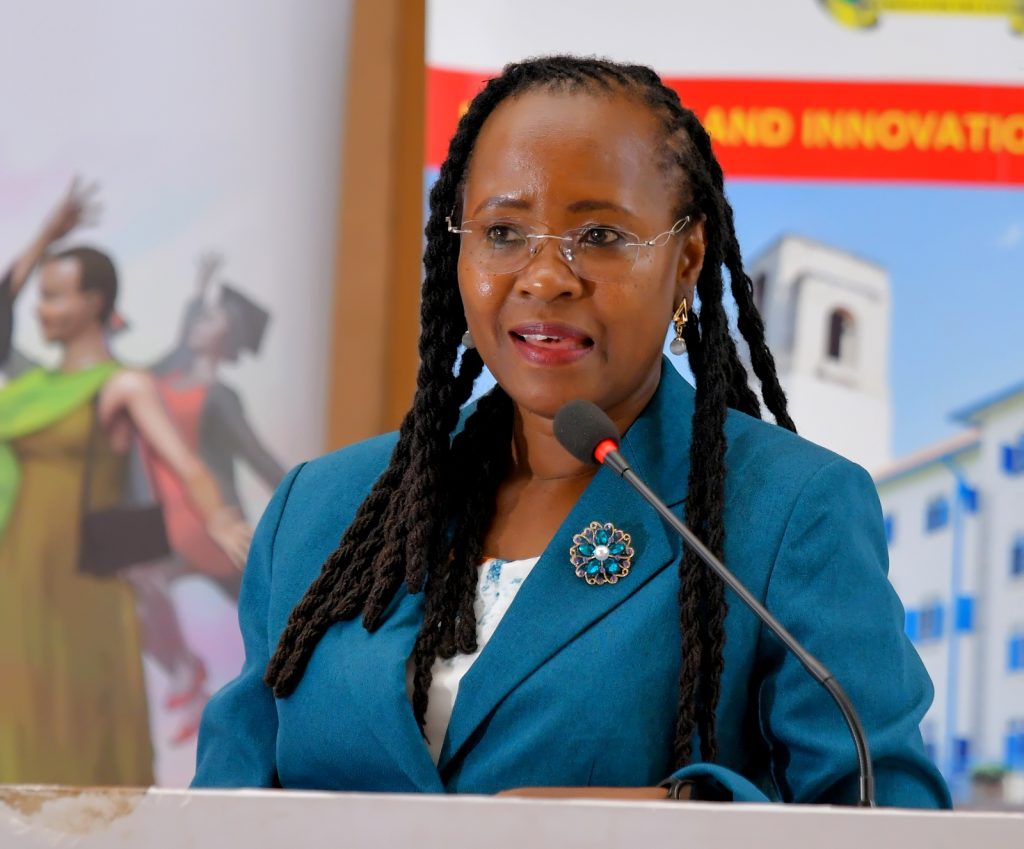
The newly appointed Principal, College of Humanities and Social Sciences (CHUSS), Prof. Helen Nkabala urged women to acquaint themselves with the different university policies if they are to effectively compete and take on leadership positions. “Know what is required of the leadership space you are vying for. You need to do policy spotlighting and read the human resource manual well as you aspire for leadership,” she advised.
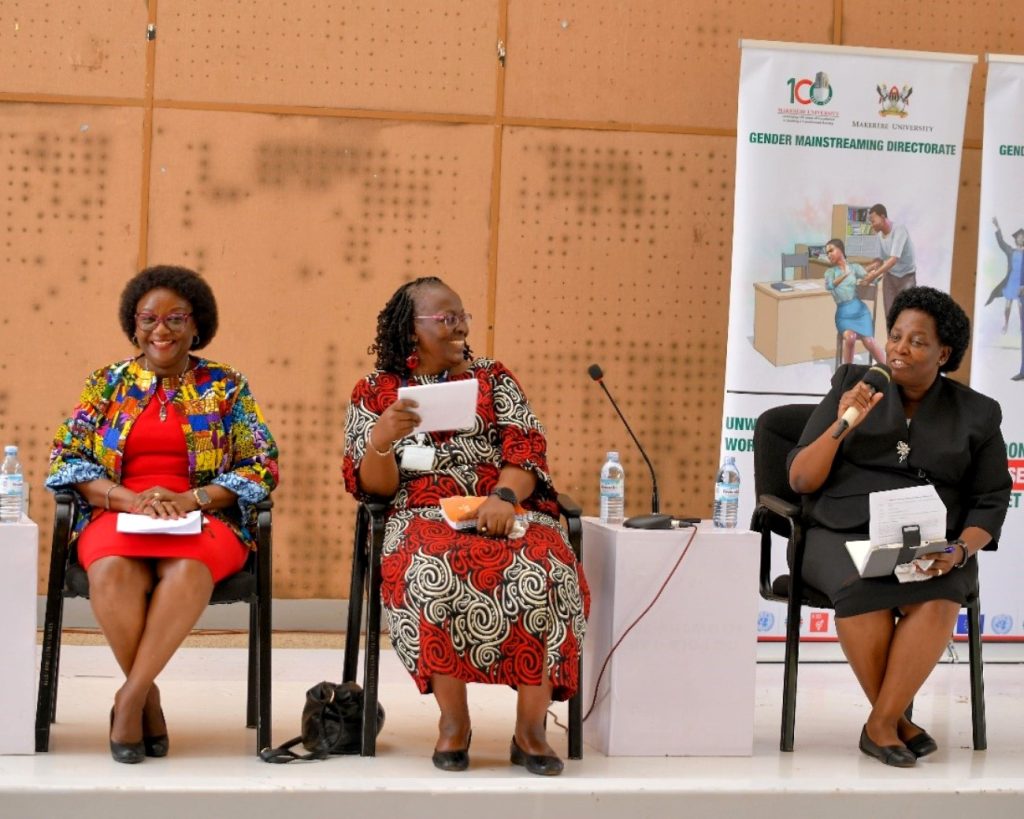
Emphasizing the need for women to support each other into leadership, she appreciated Prof. Wanyenze for looking out for her when she showed interest in taking up leadership in the Makerere University Academic Staff Association (MUASA). “Prof Wanyenze reached out to me and encouraged me. This greatly motivated me. As women, we need to support each other into these positions.”
Remarks by the DVCFA
Representing the Vice Chancellor of Makerere University, the Deputy Vice Chancellor, Finance and Administration, Prof. Henry Alinaitwe commended the Directorate for organizing the workshop to empower women leaders and pledged management to take action on the resolutions.
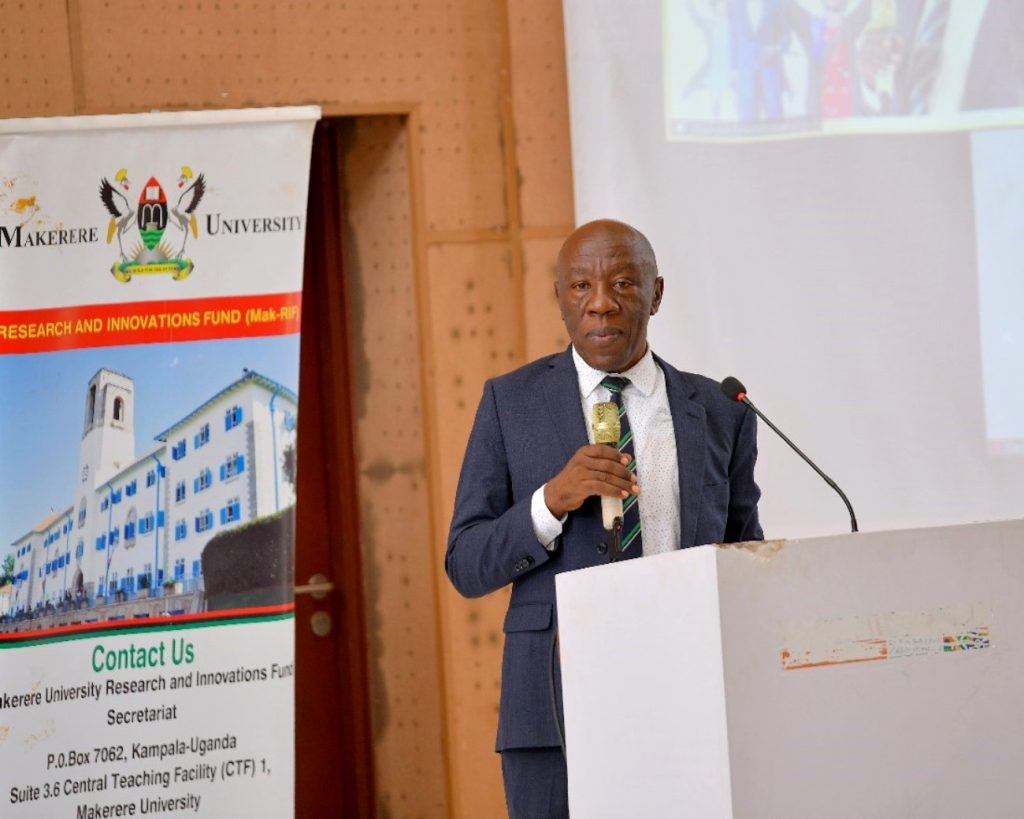
He thanked the Directorate for holding the Male engagement roundtable to discuss issues pertinent to them. He decried the dropping numbers of male graduates and called for an investigation into the causes.
Proposed objectives of a 4W Initiative Pilot at Makerere University
The Director for Africa 4W Women and Wellbeing Initiative at the School of Human Ecology, University of Wisconsin-Madison, USA, Ms. Deborah Kaddu-Serwadda noted that Uganda can leverage the successes of Makerere University’s gender mainstreaming policy to build a critical mass of university students, faculty, and staff, able to work together. She mentioned some of the proposed objectives of a 4W Initiative Pilot at Makerere University, Uganda as: piloting an interdisciplinary multigenerational higher education collaboration for the promotion of gender equality and women’s wellbeing. The pilot project would further initiate an academic women leaders’ South to North research-to-action network for gender equality and social transformation.
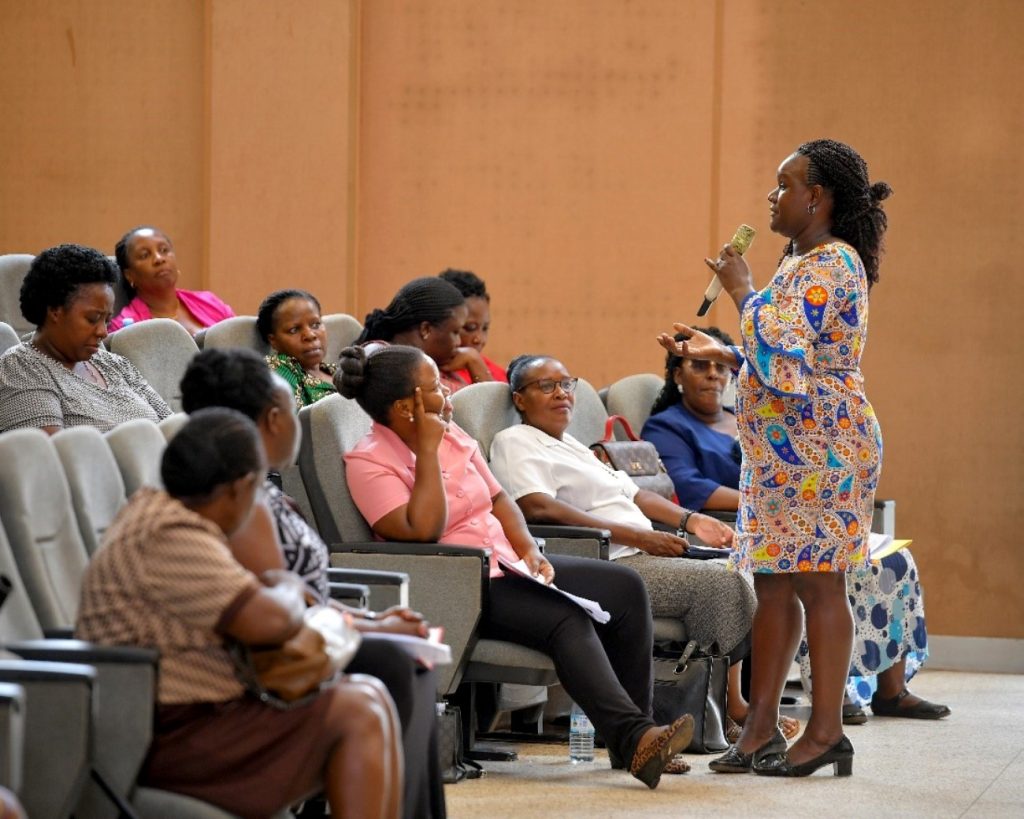
Giving the background on the women in leadership training workshops, a Principal Gender Officer at GMD, Ms. Susan Mbabazi noted that the programme had accomplished many activities such as ; 1) A situational analysis of the gender terrain of the 6 universities focusing on among others the gender composition of staff in leadership positions, 2) Development of training guides/manuals on women in leadership, mentorship, gender responsive research and male engagement, and 3) Findings of the situational analysis in the six participating universities were disseminated in each of them.
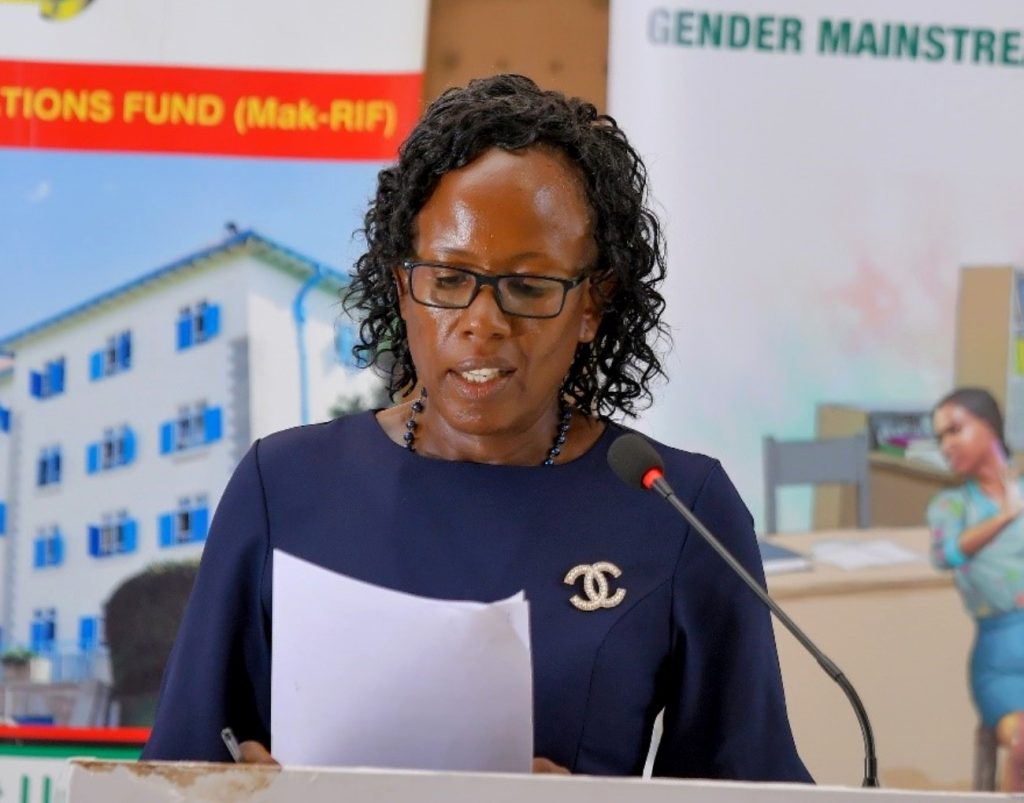
Ms. Mbabazi noted that that the programme still had pending activities such as conducting workshops using the developed training guides/manuals in all participating universities starting with Makerere University.
The Senior Gender Officer at GMD, Mr. Eric Tumwesigye commended women for being supportive and inspirational. “All the ladies I have moved and worked with in my life journey have really been inspirational,” he said.
The workshop was moderated by Mr. Tumwesigye and attended by senior academic and administrative female staff of Makerere University.
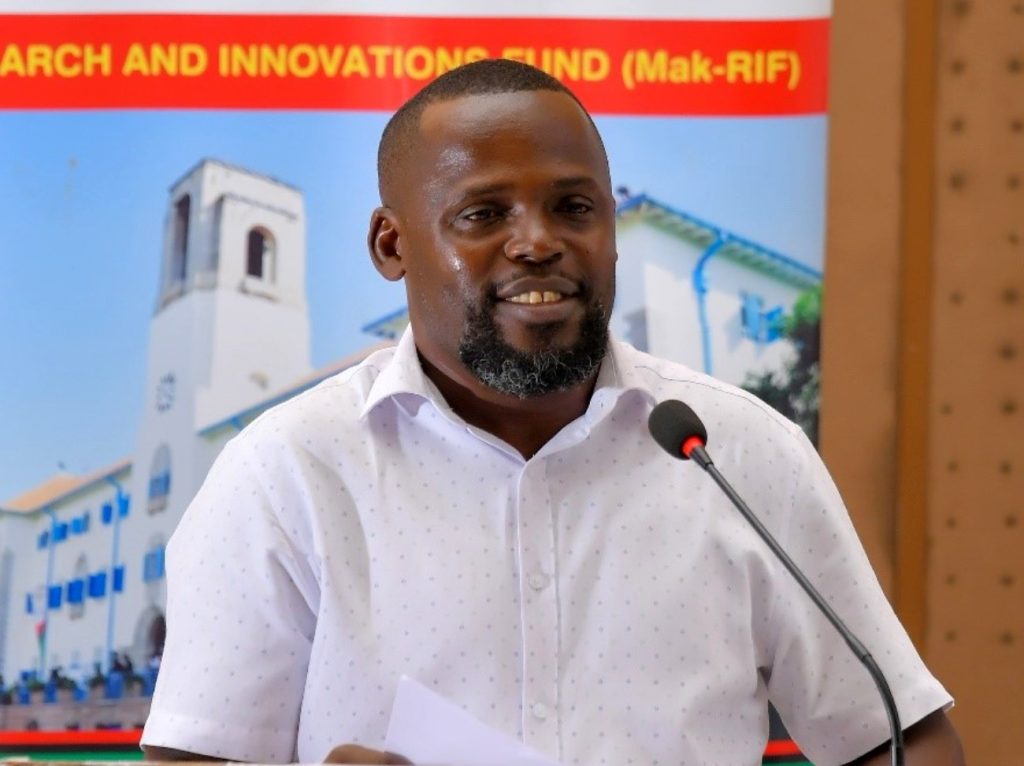
You may like
-


Simplicity, Service & Scholarship: Hallmarks of Professor Livingstone Luboobi’s Legacy
-


EfD-Mak Holds 2nd Advisory Board Meeting: Charts Path for Growth
-


Public University Legal and Accounting Officers Trained on Governance and Compliance
-


Celebrating the Life of Prof. Livingstone Sserwadda Luboobi
-


Fare Thee Well Prof. Luboobi
-


Strengthening Grants Management Through Institutional Collaboration and Capacity Building
General
Simplicity, Service & Scholarship: Hallmarks of Professor Livingstone Luboobi’s Legacy
Published
9 hours agoon
July 18, 2025By
Eve Nakyanzi
On Wednesday 16th July 2025, Makerere University lost one of its most cherished sons, Professor Livingstone Sserwadda Luboobi. Described as a mathematician, academic leader, and humble servant, Professor Luboobi devoted more than five decades to the university, rising through the ranks to become Vice Chancellor, and leaving a legacy defined by simplicity, service, and scholarship.
Born to Lameka Serwadda and Sanyu Serwadda on 25th December 1944 in Mitondo, Kalisizo, Kyotera District, Professor Luboobi’s academic career begun as a third-year student at Makerere and continued with unwavering loyalty until his passing. His life’s work reflected not only a commitment to mathematics but also nurturing generations of scholars and leaders across Uganda and beyond.
A funeral service was held in his honour at St. Francis Chapel, Makerere University on 18th July 2025. It was a moment of solemn remembrance and heartfelt tribute. Rev. Canon Dr. John Senyonyi delivered the sermon titled “Only God Knows,” reminding mourners of the mystery and grace of life’s journey. Rev. Canon Geoffrey Byarugaba represented the Kampala Diocese at the service, while former St. Francis Chaplain, Rev. Dr. Canon Johnson Ebong thanked Professor Luboobi for spearheading the Chapel’s expansion. Friends, colleagues, and family members filled the chapel, joined in mourning but also in gratitude for a life that had deeply touched theirs.

Mrs. Lorna Magara, Chairperson of the University Council, spoke movingly about Professor Luboobi’s faithfulness, likening his life to the biblical call in Mark 10:43, “Whoever wants to become great among you must be your servant.”
In his condolence message, the Vice Chancellor, Professor Barnabas Nawangwe, hailed Professor Luboobi as a visionary leader whose legacy is deeply woven into Makerere’s identity as a research-led institution. He credited Professor Luboobi with laying the groundwork for a culture of inquiry—championing graduate programmes, encouraging doctoral training, and fostering international collaborations that strengthened the university’s research profile. “He believed in building systems, not just structures,” noting that many of Makerere’s current research policies stem from his leadership. Even in retirement, Professor Luboobi remained a source of wisdom and guidance, quietly shaping the future of the university he so deeply loved.
Speaker after speaker painted a portrait of a man who led not by pomp, but by quiet strength and deep conviction. The Principal, Professor Winston Tumps Ireeta, speaking on behalf of the College of Natural Sciences (CoNAS), described Professor Luboobi as a foundational figure whose influence is deeply etched in the structures and spirit of the college. He spoke with emotion about Luboobi’s unwavering commitment to academic integrity and his belief in the power of mentorship.

“He was not just a mathematician,” Professor Ireeta said, “he was a visionary who understood the soul of the university. Even in retirement, he remained an advisor, a guide, and a quiet force of wisdom.” He concluded by saying that the college would continue to draw from his example as it navigates the future of science and innovation in Uganda.
Professor Luboobi’s illustrious career at Makerere University included serving as Head, Department of Mathematics from 1990 to 1991. The current Head of Department, Dr. Ismail Mirumbe remembered him as a pillar in the teaching and development of mathematics in Uganda
Professor John Mango, who served as Head, Department of Mathematics during Professor Luboobi’s term as Vice Chancellor from 2004 to 2009 described him as a towering figure of integrity and principle, someone who not only upheld the highest standards of academic conduct but insisted that others around him do the same. “He was a pillar in the department,” Prof. Mango remarked, “and his moral compass was unwavering.”

He recalled instances where Professor Luboobi made firm decisions, including terminating contracts when integrity was compromised, setting a tone that shaped the department’s reputation for honesty and excellence. Even as Vice Chancellor, he remained deeply involved in the department’s affairs, teaching, supervising students, all the while handling top administrative duties punctually. Prof. Mango spoke with great admiration of a man who led by example, mentored many, and whose contributions to mathematics education, research, and policy-making continue to shape the future of the discipline in Uganda and beyond.
According to an article from 1990 written by Dr. Vincent Ssembatya and Andrew Vince at the University of Florida, the Uganda Mathematical Society (UMS), which was formally established on 25th November, 1972 has since inception enjoyed major support from Makerere University and Kyambogo University in terms of infrastructure and leadership. Professor Paul Mugambi, who was also present at Professor Luboobi’s funeral service was elected first president of the UMS. Dr. Saul Nsubuga from the Department of Mathematics represented UMS at the service, honouring Professor Luboobi’s pioneering role in the discipline.
The service also featured tributes from close friends and family. Loved ones shared stories of a man who remained grounded no matter how high he rose, a man who valued relationships and walked closely with his faith. His children and grandchildren remembered him as a father who was ever-present, a listener, and a source of steady guidance.

Professor Daniel Kibuule, son of the late Professor Luboobi and Dean, Faculty of Health Sciences at Busitema University, delivered a deeply personal tribute that painted a full portrait of his father’s life, values, and final days. He expressed gratitude to the University leadership, family, friends, and medical professionals who stood with them during a challenging period. He particularly thanked his siblings, Dr. David Kimera and Dr. Irene Nakiyimba for their unwavering role in caring for Professor Luboobi through illness.
He spoke of a man who, despite great academic accolades, remained deeply humble and committed to discipline, simplicity, and faith. From instilling punctuality and responsibility to ensuring his children charted their own paths, none bearing his surname “Luboobi”, Prof. Luboobi was intentional in every lesson he passed on. Kibuule recalled his father’s insistence on being at home even in his final moments, his strong connection to Christ, and his quiet strength despite his failing health.
Former students and mentees echoed the same sentiments, of a teacher who was generous with his time and invested deeply in others’ growth. The community that gathered was not only there to grieve but to celebrate the quiet legacy of a man whose example continues to live on.
Among the mourners were public figures and leaders, including Hon. Abed Bwanika, Member of Parliament for Kimanya-Kabonera, Hon. Nyombi Thembo, the Executive Director Uganda Communications Commission, and Hon. Dr. Ham-Mukasa Mulira, former Minister of ICT, among others.
In his passing, Makerere University has lost a pillar, but his life reminds us that greatness lies in consistency, in humility, and in service to others. Professor Luboobi’s memory will continue to live on in the minds he shaped, the systems he built, and the values he embodied. He ran his race with grace.
The Writer is a Volunteer in the Public Relations Office, Makerere University
Please click the embedded video below to view the service livestream
General
Public University Legal and Accounting Officers Trained on Governance and Compliance
Published
2 days agoon
July 17, 2025By
Eve Nakyanzi
Legal and accounting officers from public universities across Uganda have convened, for a high-level training workshop organized by Makerere University. The three-day training, taking place from July 16th to 18th, 2025, is aimed at strengthening legal frameworks, improving institutional governance, and ensuring compliance with public finance and procurement laws within higher education institutions.
Ms. Lorna Magara, Chairperson of the Makerere University Council and Guest of Honour at the opening session, commended the initiative as timely and necessary. She addressed the growing backlog of court cases affecting Makerere and other public universities and outlined measures already taken to mitigate legal risks. These include the establishment of a Legal Rules and Privileges Committee and the Directorate of Legal Affairs, part of a broader strategy to improve legal compliance and foster good governance.
Representing the Vice Chancellor, Prof. Winston Tumps – Ag. Deputy Vice Chancellor (Finance and Administration), described the training as both strategic and practical. “It is imperative that we learn from each other, especially in how we handle employee litigation and institutional legal risks,” he remarked. He added that the program is designed to promote experience-sharing across universities and enhance collective institutional growth.

In his address, Mr. Yusuf Kiranda, University Secretary at Makerere University, emphasized the urgent need for robust legal oversight and more effective case management mechanisms within public universities.
The training featured a keynote address by the Attorney General of Uganda, Hon. Kiryowa Kiwanuka, who provided critical insights into legal expectations for public institutions. He warned that failure to heed legal advice could result in personal liability for accounting officers, citing a precedent involving the Uganda Cancer Institute. “Universities must consult the Attorney General’s chambers before entering into major contractual obligations,” he advised, urging legal officers to document decisions meticulously as proper record-keeping forms the first line of defense in legal disputes.

Hon. Kiwanuka further discussed the government’s ongoing efforts to recentralize legal services to ensure alignment with the Attorney General’s office. He cautioned in-house counsel against becoming overly entangled in decision-making processes, stressing the need for objectivity. Other key issues he addressed included contract approvals, misuse of Memoranda of Understanding (MoUs), and lapses in procurement processes, particularly at the close of financial years.
Participants also benefited from insights by Hon. Justice Musa Ssekaana of the Court of Appeal, who offered an in-depth analysis of judicial review and its significance in promoting lawful, transparent university governance. He called on university legal officers to act with clarity, timeliness, and accountability.
Lady Justice Joyce Kavuma, Judge of the High Court, delivered a comprehensive presentation on dispute and claim management involving public universities. She addressed emerging trends in civil litigation, emphasizing the importance of due process, transparency, and clear communication in resolving employment, student, and contractual disputes. Drawing on real case examples, she urged institutions to strengthen internal systems, embrace participatory governance, and adopt regional best practices to minimize litigation and protect institutional reputation.

The training reflects a shared commitment among public universities to build a more accountable, legally sound, and strategically aligned higher education system in Uganda. Through peer learning and collaboration, participating institutions aim to reduce litigation, enhance institutional autonomy, and uphold the rule of law.
Participating universities include Makerere University, Kyambogo University, Mbarara University of Science and Technology, Busitema University, Mountains of the Moon University, and Lira University.
The training concludes on July 18th 2025, with sessions focusing on employment dispute management in public universities and the implications of recent PPDA Appeals Tribunal decisions on procurement and disposal practices within public entities.
General
Celebrating the Life of Prof. Livingstone Sserwadda Luboobi
Published
2 days agoon
July 17, 2025By
Mak Editor
A Visionary Leader, Seasoned Mathematician, & Humble Academician
It is with profound love and respect that we celebrate the life of Prof. Livingstone Sserwadda Luboobi, a distinguished scholar, transformative leader, and beloved Vice Chancellor Emeritus of Makerere University. His legacy is woven in the fabric of African higher education, marked by intellectual brilliance, unwavering commitment to academic excellence, and a life of selfless service.
A Life of Purpose and Vision
Prof. Luboobi was more than a mathematician. He was a visionary, whose work transcended equations and research papers. Serving as Vice Chancellor from 2004 to 2009, he led Makerere University through a critical period of growth and transformation. Under his guidance, the university expanded its reach, strengthened its academic rigor, and embraced innovation and reform. His calm demeanour and principled decision-making earned the admiration of students, faculty, and peers alike.
Prof. Luboobi was deeply committed to nurturing talent and fostering intellectual curiosity, leaving an indelible mark on the institution’s culture and future direction.
Beyond Uganda, Prof. Luboobi’s influence resonated across the global academic community. He was a passionate advocate for the transformative power of science and education, often speaking at international forums and collaborating on research that bridged continents and disciplines. His work helped elevate the profile of African scholarship on the world stage.
His legacy endures not only in the impressive body of work he left behind but also in the countless lives he touched – students, educators, and leaders who continue to draw inspiration from him.
Academic and Leadership Journey at Makerere University
An illustrious alumnus of Makerere University, Prof. Luboobi graduated with First Class Honours in Mathematics, laying the foundation for an extraordinary academic journey. He pursued further studies at the University of Toronto (MSc in Operations Research, 1971-72) and the University of Adelaide (PhD in Biomathematics, 1978–80). His scholarly journey spanned prestigious institutions worldwide, including UCLA, the University of Bergen, and the University of Dar es Salaam, establishing him as a scholar of global repute and a proud ambassador of African intellectualism.
Prof. Luboobi’s service to Makerere begun in 1970 as a Special Assistant-remarkably, while still an undergraduate, rising through the ranks to full Professor in 1997. He served as Head of Department, Dean of the Faculty of Science (1994–2001), and later became the university’s first elected Vice Chancellor. His tenure brought new energy to institutional leadership, characterized by transparency, inclusivity, strategic direction and accountability.
Strategic Reforms and Institutional Impact
A true architect of transformation, Prof. Luboobi chaired the development of Makerere’s first locally-conceived Strategic Plan (1990–91). He was instrumental in securing a UGX30 billion grant from NORAD in 1999, which revitalized key academic areas such as computing, gender studies, and food science. He co-founded the Makerere University Private Sector Forum, bridging the gap between academia and industry, and strengthening alumni engagement and resource mobilization.
Pioneering Biomathematics and Mentorship
As one of Africa’s pioneering biomathematicians, Prof. Luboobi introduced mathematical modeling to tackle real-world problems in epidemiology, ecology, and operations research. His scholarly contributions – over 150 publications – reflect the depth and breadth of his research. Yet, perhaps his most lasting impact lies in mentorship: he supervised more than 35 PhD and over 50 MSc students, including Makerere’s first female PhD graduate in Mathematics, nurturing a generation of scholars and leaders.
Prof. Luboobi’s Contribution to the Internationalization of Makerere University
Prof. Luboobi played a pivotal role in advancing the international profile of Makerere University. Demonstrating remarkable personal commitment, he utilized his own resources to support the establishment of the University’s International Office. This strategic initiative laid the foundation for a more structured and effective engagement with global academic institutions, development partners, and international students. As a result, Makerere University significantly enhanced its global footprint, forming numerous international collaborations and attracting increased academic and research opportunities from abroad.
In addition to his contributions to internationalization, Prof. Luboobi was also instrumental in revitalizing the University’s Public Relations Unit. Under his guidance, the unit adopted more proactive and professional communication strategies, which greatly improved the institution’s public image. This, in turn, fostered greater public trust and strengthened the university’s reputation both locally and internationally. His visionary leadership in these areas has had a lasting impact, positioning Makerere University as a leading institution in East Africa and beyond.
Global Recognition and Enduring Legacy
Prof. Luboobi’s contributions earned him widespread recognition. In 2008, the University of Bergen awarded him an Honorary Doctorate for his role in internationalizing academia. Makerere University honoured him with a Lifetime Achievement Award in 2013, and the Government of Uganda conferred upon him a National Gold Medal for his unwavering service to education and national development.
Even after retirement, Prof. Luboobi remained an active contributor to academic life-lecturing, supervising, and advising the university.
A Lasting Light in African Academia
Prof. Livingstone Sserwadda Luboobi’s life was a model of scholarship anchored in service, leadership tempered with humility, and an unshakable belief in the power of education. He leaves behind a vibrant academic legacy and a trail of inspired minds. His contributions will continue to shape Makerere University, Uganda, and the global academic community for generations to come.
We extend our heartfelt condolences to his family, colleagues, and the entire Makerere University community during this difficult time.
May his soul rest in eternal peace.
Trending
-

 General2 weeks ago
General2 weeks agoRe-advert: Admission to Undergraduate Programmes 2025/2026
-

 General1 week ago
General1 week agoRe-Advert for Applications for Diploma and Certificate Training
-

 General5 days ago
General5 days agoMakerere University Fees Waiver for 40 First Year Female Students 2025/2026
-

 General2 weeks ago
General2 weeks agoPress Statement on Ranking
-

 Health1 week ago
Health1 week agoCall for Applications: Responsible Conduct of Research (RCR) Training Course
